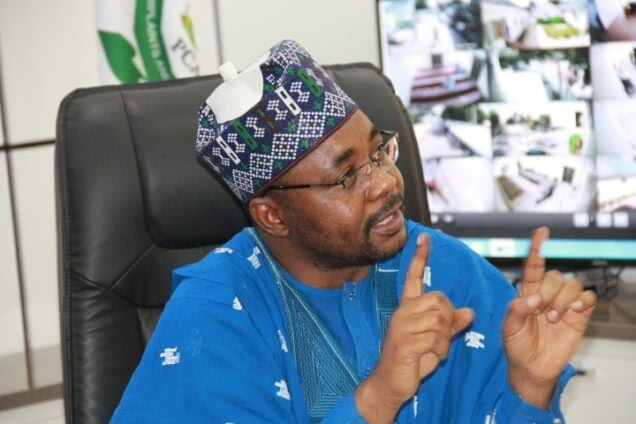No fewer than 140 officials will track and assess the performance of federal ministries, departments, and agencies ahead of the first assessment exercise at the end of this month.
This is as the officials joined the third technical retreat for delivery desk officers of federal ministries on the implementation of presidential priorities and ministerial deliverables in Uyo, Akwa Ibom State capital, which began on Wednesday.
A senior official working closely with the Central Delivery Coordination Unit headed by the Special Adviser to the President on Policy Coordination, Mrs Hadiza Bala-Usman, revealed that the officers, who would conduct the assessment, were drawn from 35 federal government ministries, departments and agencies.
“It will involve a permanent secretary and directors of planning and other officials, four each from 35 ministries. They are considering the modalities of the assessment, the key performance indicators and the reporting mechanisms and all of those,” the official who did not want to be mentioned told one of our correspondents.
At the retreat, Bala-Usman echoed President Bola Tinubu’s words to participants when she warned that her principal would sack ministers who failed to perform their duties.
She noted that Tinubu was poised to deliver on his promise of making life better and easier for Nigerians.
Calling for the total commitment of delivery officers and directors of planning in ministries, Bala-Usman said, “We must understand that the President is very serious about his promises and that ministers will be assessed, and ministers will be dropped if they don’t perform.
“You must understand that as ministerial delivery desk officers, you are the engine room that will provide that feedback, constantly track ministerial progress, and report challenges and bottlenecks to the central coordinating and delivery unit.”
The presidential aide, who dove into the specifics, explained, “In the Ministry of Aviation, we will be assessing FAAN on customer experience at the airports; are the escalators, lifts, and conveyor belts functional?
“What are the consequences of delayed time of departure for airlines? These are things that everybody can feel and see.
“When talking about agriculture, we want to see our index of fertiliser use per hectare grow because of the attendant investment that has been made in fertiliser interventions.”
On October 17, 2023, Bala-Usman said her office would begin a quarterly assessment of the performance of the 48 ministers (now 47) appointed by the President by January 2024.
She said January would be the best period to begin the exercise as all the ministries would have received their budgets for the 2024 fiscal year.
“We’re looking to commence an assessment of the respective ministries in January 2024. We’re going to have a quarterly assessment of performance, which will culminate into an annual scorecard,” the former boss of the Nigerian Ports Authority explained in an interview on TVC.
She said the annual scorecard would be reviewed during periodic retreats where performances would be assessed against key performance indicators.
The three-month period for the first evaluation will follow a three-day cabinet retreat for ministers and presidential aides, which was held from November 1 to 3, 2023, where ministers signed a performance bond with the President.
The bond signed by each minister and permanent secretaries detailed the deliverables each ministry plans to achieve within the 2024 budget cycle.
“That performance bond is what we’re going to use to track the performance of the ministers,” Bala-Usman had said.
Lawyers, CSOs comment
Commenting on the development, a Senior Advocate of Nigeria, Chief Mike Ozekhome, said the performance review of the ministers should not be the priority of the government as the nation was in a dire strait.
He stated, “This President should be one in a hurry. This country is battered and tattered. The country is bleeding. The people are downtrodden. There is anger and melancholy. There is poverty. There is agony. Nigerians are crying and in abject penury. There is gnashing of teeth across the divides in Nigeria.
“How can a bag of rice be selling at over N55,000 and the Presidency is talking about assessing ministers? Take a look at the naira that is currently in a free fall because we are subjected to neo-colonial dictates from the World Bank and the International Monetary Fund.
“To me, it is a case of ‘Physician heal thyself’ as the President is trying to heal the ministries. To assess a minister is to know the deliverables. What benchmark did the President set when he appointed the ministers? What was in the All Progressives Congress manifesto as to their deliverables?
“Since the ministers were sworn in more than six months ago, what have they done? If we take the Ministry of Works, for instance, it will be easy to assess how many roads have been constructed or started or earmarked for commencement. But, for other ministries like special duties; how will they be assessed?
“As for the Ministry of Poverty Alleviation and Humanitarian Affairs, how will they assess them? Where is all the money that has been pumped to alleviate poverty? Why is there so much poverty in the land? What number of Nigerians has been brought out of poverty? What are the verifiable indices to show that this has been done? I have already seen some ministers who are not performing at all. Some of them are just there like onlookers.”
On his part, Chief Yomi Alliyu (SAN), faulted the move, saying, “In the first instance, I don’t see how anyone will assess a minister. The criteria are bound to be subjective rather than objective. This is because ministers are not really the ones working in the ministries. They are just policymakers. The civil servants are the ones who will implement policies. In that instance, it is the members of the public who can assess whether a minister is working or not.
“A minister could be hyperactive and corrupt. We have seen ministers use their former companies as pipes to siphon government money from another ministry and some of them are still serving.
“You will not say because a minister has some media hype, he will score well and perform. Sometimes, it is not the people that you hear of who are the performers in this country. Nobody can evaluate any minister other than members of the public.”
Also reacting, another senior lawyer, Mr Ebun Adegboruwa (SAN), stated that it was PresidentTinubu himself who needed to be assessed.
“I don’t think the President has the moral justification for such an assessment. It is the President himself who needs an assessment. The ministers have no direct responsibility to the people of Nigeria. They were not the ones elected. The buck stops on the President’s table. Is it for the insecurity, inflation, or the collapse of the exchange and forex regime?” he queried.
Civil Society Organisations called on Tinubu to suspend ministers who underperform or are found to be enmeshed in corrupt practices.
The Chairman of Civil Society Organisations in Rivers State, Enafaa Georgewill, made the call in an interview with one of our correspondents, adding that ministers could be likened to employees who should be held accountable when necessary.
Georgewill stated, “The President can be likened to an employer and if an employer employs an employee and the employee is not performing as expected, he who hired them should fire them and where there is a need for caution, disciplinary action like suspension and other reprimand actions should be taken.
“Until those in authority, and in this case, the President, begin to instil discipline and real governance, as well as social welfare, we will not be able to make real progress. So, yes, the President has the power to reprimand ministers and he should use it.”
The Director of Youths for Change, Taiwo Oyayinka, urged the President to ensure the dismissal of underperforming ministers as he had earlier promised.
He said, “President Tinubu promised us last year that ministers who underperform would be dismissed; he should stand by this charge. Corrupt ministers should be flushed out of the system.
“Such an action will serve as a deterrent to others. There should be no sacred cow in power. All those found culpable should be suspended or dismissed.”
A chieftain of the Peoples Democratic Party, Segun Sowunmi, said the assessment of ministers was a novel idea, but noted that such an endeavour must be holistic.
He said, “This is the first time we have heard that ministers are going to be accessed and that there will be consequences after the assessment, but you know anything with government, especially in our country, it is always better for you to exercise some caution because if you celebrate early, you may just end up disappointed.
“On the surface, it is a good idea; maybe it will help us scale up service delivery. Also, maybe the report of the assessment can serve as a benchmark either for the others or people who will be taking government office.”
The National Secretary of New Nigeria People’s Party, Mr Oladipupo Olayokun, “I think that is the normal thing to do because when you give someone an assignment, you should periodically assess his performance because don’t forget that the President told Nigerians that the ministers would be assessed. It is a departure from what we witnessed in the past eight years, especially given what Nigerians are experiencing under this government.”
The National Director, Media and Publicity of the Labour Party, Dr Yunusa Tanko, said, “Any minister found wanting shows he or she is not qualified to serve the country. If the President wants to begin to screen his aides, that means he must have presented himself for screening ab initio. He does not have a locus standi to start screening people because if they were screened ab initio, we would have known about their credentials.”
Additional reports by Godfrey George, Victor Ayeni and Daniel Ayantoye











